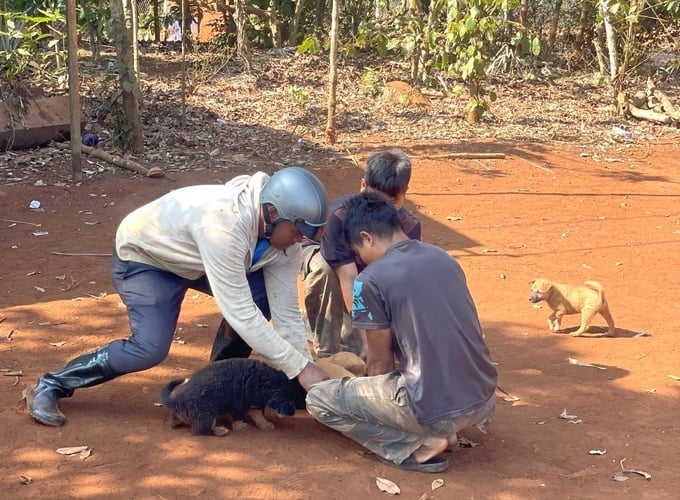May 27, 2025 | 09:50 GMT +7
May 27, 2025 | 09:50 GMT +7
Hotline: 0913.378.918
May 27, 2025 | 09:50 GMT +7
Hotline: 0913.378.918

General Director of the Department of Animal Health Nguyen Van Long visiting a family with a member who had died from a rabid dog bite. Photo: Tuan Anh.
There has been an increase in the number of rabies cases in the first three months of 2024, with 27 fatalities and over 100,000 patients requiring pre-exposure prophylaxis treatment, marking an 11% increase compared to the same period in 2023.
In reponse to the rapidly increasing number of deaths and pre-exposure prophylaxis treatment for rabies, Deputy Prime Minister Tran Luu Quang signed and issued the Prime Minister's Directive No. 22/CD-TTg on the strict implementation of rabies prevention and control measures.
During a recent interviewwith the Vietnam Agriculture Newspaper, General Director of the Department of Animal Health Nguyen Van Long addressed the state of rabies prevention and control efforts across various regions in Vietnam.
During on-site inspections in different provinces, especially in the Central Highlands, what are your comments on the local management and implementation of rabies prevention and control measures?
Based on my on-site inspections in different provinces, I have established that the local management and implementation of rabies prevention and control measures have been progressing slowly, and not in compliance with the issued directives.
Although provinces and districts have received instructions from the Prime Minister and the Ministry of Agriculture and Rural Development regarding rabies prevention and control, the organization and implementation of these measures in practice are crucial. Notably, these activities should be deployed by the People's Committees at the commune, hamlet, and village levels.
As a result, the local governments are responsible for inspecting, expediting, and taking disciplinary actions against the commune-level authorities that fail to implement or delay the implementation of the three most critical tasks: information dissemination, dog population management, and rabies vaccination.
On the other hand, the rabies prevention and control plans for the provincial and district levels are delayed with a slow progress. Despite the severity of the current outbreak, many local governments, especially at the district level, have not approved a response plan or allocated funds. Additionally, some local governments have only allocated vaccination funds for approximately 50% of the total dog population, which fails to meet the requirements outlined by the Prime Minister and the Ministry of Agriculture and Rural Development.
Moreover, during the on-site inspections, I have observed that many districts either failed to approve a response plan, or issued plans at different timeframes, resulting in inconsistencies in the implementation of rabies prevention and control measures. I recommend provinces to assign their respective local Departments of Agriculture and Rural Development and Sub-Departments of Livestock Production and Animal Health with issuing and organizing a consistent rabies prevention and control plan across the entire province, with an emphasis on procuring and administering vaccinations for dogs.
In addition, information dissemination and communication activities in the local communities are limited, irregular or impractical. As a result, it is necessary to disseminate information through hamlets, party cells, women's unions, youth unions, etc., using language that is appropriate for ethnic minority communities.

The number of rabies cases has recently exhibited an upward trend in Vietnam. Photo: Tuan Anh.
Regarding rabies prevention and control measures, the management of the dog population is considered to be crucial. How have the local governments been managing their dog populations and administering rabies vaccinations?
In reality, the majority of local governments are unable to effectively manage their dog populations, resulting in inaccurate statistics on the total number of dogs. This is a critical issue that requires extensive communication, guidance, and warnings for dog owners. Failure to register and confine dogs should result in strict penalties. Villages and communes must manage and address instances of deliberate violations.
Furthermore, the vaccination rate against rabies is alarmingly low across different provinces due to a lack of planning, delays, or impractical plans. Notably, the vaccination rate for dog populations is in the single digits in several areas.
Consequently, I believe that provinces must organize the procurement and distribution of rabies vaccines, and promptly administer them to local dog populations.
Additionally, many local governments have failed to conduct investigations or collect samples for testing, despite the Department of Animal Health providing nationwide testing support for the last two to three years. Sample collection in the provinces of Gia Lai and Lang Son has resulted in alarmingly high rates of positive cases.
During on-site inspections, I have also observed that local governments failed to fulfill their responsibilities, with signs of leadership negligence, a lack of attention to local management, and delays or inadequate budget allocation for rabies vaccinations. Dog owners may be subject to strict penalties; however, their dogs are not confined or vaccinated accordingly.
Is the unsatisfactory implementation of rabies prevention and control measures caused by limitations within the animal health and preventive healthcare systems at the grassroots level?
We must acknowledge that the current system for local animal health management is limited, with some provinces even lacking district-level veterinary facilities. Furthermore, the Departments of Agriculture and Rural Development and the Agricultural Service Centers at the district level are relatively indifferent towards providing guidance, expediting, and supervising the implementation of rabies prevention and control.
Despite the Prime Minister's instructions to allocate funds for rabies vaccination, local plans are either absent or insufficient, resulting in dangerously low vaccination rates for dog populations. On other hand, veterinary personnel face great difficulty and danger in catching and vaccinating dogs, which can harm their health and lives.
I request local governments to urgently rectify and enhance the capacity of the animal health management system across all levels, in compliance with the Law on Animal Health, directives from the Party Central Committee, National Assembly, and Decision No. 414/QD-TTg issued by the Prime Minister on March 22, 2021. Namely, Decision No. 414 approved the Project to enhance the capacity of the animal health management system at all levels from 2021 to 2030, thereby effectively mobilizing resources for the implementation of rabies prevention and control measures.
Regarding the preventive healthcare system, I have observed a lack of comprehensive data on the number of people bitten by dogs and receiving prophylactic treatment. Notably, some provinces lack a state-managed preventive treatment facility, relying entirely on private healthcare providers.
The current level of coordination between veterinary and preventive healthcare personnel is inadequate, with limited information sharing, resulting in challenges in rabies prevention and control efforts.
What must local governments do to effectively perform their rabies prevention and control duties in the future?
I suggest local governments to issue strict directives and instructions at all levels to ensure compliance with regulations, and address challenges in terms of three critical tasks: raising awareness through information dissemination programs to foster responsibility among dog owners, effective management of dog populations, and vaccination against rabies for dogs.
Translated by Nguyen Hai Long

(VAN) The mutual export of agrifood products between the European Union (EU) and the United Kingdom (UK) must occur again without certification, border controls or other red tape. This was agreed at the UK-EU summit.
/2025/05/22/5121-2-173645_677.jpg)
(VAN) NBSAP Tracker identifies strengths and areas for improvement in the National Biodiversity Strategy, based on each region’s priorities and capacities.

(VAN) The draft amendment to the Circular on rice export trading stipulates a periodic reporting regime for rice exporting enterprises.

(VAN) Dong Thap farmers attained an average profit margin of 64% during the summer-autumn 2024 crop (first season), while An Giang and Kien Giang farmers followed with 56% and 54%, respectively.

(VAN) As a doctoral student doing research on renewable energy and electrification at Harvard University, the author shares his musings on electricity, nature, and countryside memories.

(VAN) The decree on Extended Producer Responsibility (EPR) ensures transparent management and disbursement of support funds, avoiding the creation of a “give-and-take” mechanism.

(VAN) Hue City rigorously enforces regulations regarding marine fishing and resource exploitation, with a particular emphasis on the monitoring of fishing vessels to prevent illegal, unreported, and unregulated (IUU) fishing.